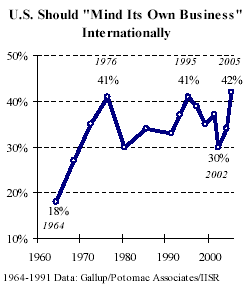"We're seeing a backlash against a bumbled foreign policy." So said Stephen Van Evera of MIT in response to the news that Americans are becoming more isolationist in their views. I would have used the term "bungled"--or even "mangled"--to describe U.S. foreign policy at present, but "bumbled" (combining "bungled" and "stumbled") works well enough.
But I digress, even before getting started.
The New York Times reports today on a Pew Research Center study of elite and general public attitudes regarding foreign policy issues. Summarizing the report, the Times article states, "The survey, conducted this fall and released today, found a revival of isolationist feelings among the public similar to the sentiment that followed the Vietnam War in the 1970's and the end of the Cold War in the 1990's."
The following chart shows the change over the past forty years in the number of Americans saying the country should "mind its own business."

Among the additional findings of the study are these:
- "Majorities in most groups of influentials say the U.S. should join the International Criminal Court. But military leaders are a notable exception--a narrow majority opposes the U.S. joining the international court."
- "Favorable opinions of the United Nations, which had declined in recent years, have fallen still further. Only about half of Americans (48%) now express a positive opinion of the U.N., down from 77% four years ago."
- "As to public perceptions of the U.S. global image, two-thirds of Americans (66%) say that the U.S. is less respected than in the past. When asked about possible reasons for global discontent with the U.S., overwhelming percentages of Americans (71%) and opinion leaders (87%) cite the war in Iraq as a major factor."
- "The public, on balance, believes cases of U.S. prisoner mistreatment in Iraq and Guantanamo Bay were mostly the result of misconduct by American soldiers rather than the consequence of official policies. Opinion leaders are divided, with solid majorities in five of eight groups saying that the prison abuse scandal was the result of official policies."
Each of these points deserves some analysis and commentary, which I hope to provide when I have a bit more time--in a year or two. Meanwhile, take a look at the report.